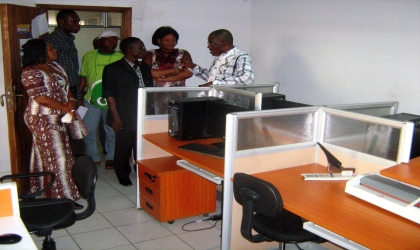Business
Shippers Council Engages Port Health Services For Protection

The Nigerian Shippers’ Council (NSC), says it has been engaging the Port Health Services to ensure that port users and all Nigerians are protected from the coronavirus.
The Executive Secretary of NSC, Mr Hassan Bello, in a statement in Lagos at the weekend, said that the engagement was important, as essential goods make their way into the country through the ports.
According to him, in its capacity as the Ports Economic Regulator and Trade Facilitator, the NSC is taking this step to ensure that cargo flow continues.
Bello said that even in hardest hit countries, port operations had continued without let or hindrance.
He said that in an interdependent world, goods continue to move around, and the manufacturing of goods cannot be halted, otherwise economies would be in bigger trouble than they are set to be as a result of the COVID-19 pandemic.
“Considering the impact of port activities on the economy, it is important that the correct state of affairs be communicated to all stakeholders in order not to exacerbate a situation which has the potential to affect the lives and livelihoods of Nigerians.
“Many essential commodities, particularly drugs, medical equipment and consumables, need to be imported by many countries including Nigeria, and that is why the ports are still operating.
“We are engaging the Port Health Services to ensure that the port, its users, and indeed the generality of Nigerians are protected from the Coronavirus,” he said.
Bello commended the federal government on the lockdown in Abuja, Lagos and Ogun States.
According to him, it is against this background that the NSC stepped up its engagement with port operators.
He said the council was providing transportation to and from the ports daily for freight forwarders during the period of the lockdown.
Bello said that the council also had discussions with some terminal operators within the week.
This, he said, led to NSC intervening on behalf of freight forwarders with banks including the Zenith Intl. Bank, United Bank for Africa and others to extend their services to port operators
He said this was for them to pay fees to various agencies to facilitate clearance of cargoes from ports as they could not afford to have terminals clogged up with more uncleared cargoes.
“NSC has made some modest contribution in cash and protective materials toward the fight against COVID-19.
“Its most important contribution is in ensuring that it does not drop the ball in terms of its responsibility as Port Economic Regulator in the very fluid and difficult times.
“This is why we continue to engage with stakeholders to ensure that the ports run as smoothly as possible under the circumstances,’’ he said.
Business
Nigeria’s ETF correction deepens as STANBICETF30, VETGRIF30 see 50% decline in a week

Business
BOI Introduces Business Clinic

Business
Dangote signs $400 mln equipment deal with China’s XCMG to speed up refinery expansion

-
Maritime3 days ago
Nigeria To Pilot Regional Fishing Vessels Register In Gulf Of Guinea —Oyetola
-

 Sports3 days ago
Sports3 days agoGombe-Gara Rejects Chelle $130,000 monthly salary
-
Maritime3 days ago
Customs Declares War Against Narcotics Baron At Idiroko Border
-
Maritime3 days ago
NIMASA,NAF Boost Unmanned Aerial Surveillance For Maritime Security
-

 Sports3 days ago
Sports3 days agoTEAM RIVERS SET TO WIN 4×400 ” MORROW” …Wins Triple jump Silver
-

 Sports3 days ago
Sports3 days agoNPFL Drops To 91st In Global League Rankings
-
Maritime3 days ago
NIWA Collaborates ICPC TO Strengthen Integrity, Revenue
-

 Sports3 days ago
Sports3 days agoNPFL Impose Fines On Kwara United Over Fans Misconduct

